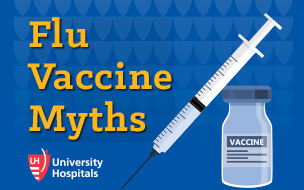Flu Season This Year: Flu Vaccines & Flu Symptoms
Getting a flu shot for you and your family is an important part of keeping everyone in your home as healthy as possible this year.
Flu vaccines are available now.
What should I know about the flu?
What are the different flu types?
There are four types of flu viruses: A, B, C and D. Human influenza A and B viruses are responsible for flu season, or the seasonal flu epidemics that occur every winter in the U.S. Influenza A can infect both humans and animals are also the only influenza viruses known to cause global flu pandemics. Influenza B viruses are less common than influenza A, and unlike type A, only infect humans. Influenza C virus infections are usually mild in humans, and influenza D viruses mostly affect cattle and are not thought to cause illness in people.
Influenza A is divided into subtypes based on the combination of proteins present on the surface of the virus. More than 130 subtypes of influenza A have been identified in nature (mostly in wild birds), but there are potentially many more combinations that have yet to be identified.
When is the best time to get the flu vaccine?
You are encouraged to get a flu vaccine every year, preferably before November. Influenza can often circulate at the same time as other respiratory viruses such as RSV and COVID-19, and these illnesses can have similar symptoms. The flu vaccine is updated each season as needed to protect against the influenza viruses that research indicates will be most common during the upcoming season.
Get the Flu Vaccine. Your Heart Will Thank You
Getting your annual flu vaccine protects you from developing serious respiratory symptoms. But did you know it can also protect your heart? Learn more.
Read MoreWhy get the flu vaccine?
Even if you get a strain of the flu not covered by the vaccine, you will experience milder symptoms and recover faster if you get a flu shot this season. People who get the flu vaccine are less often hospitalized and may develop fewer complications that can lead to death.
Flu vaccination is especially important for people age 65 years and older because they are at high risk of developing serious complications from flu. A high-dose vaccine is available for these older adults, whose immune response is weaker than those who are younger. Persons over 65 may receive any vaccine available to them even if the high-dose vaccine is not available.
How and where can I get vaccinated?
University Hospitals primary care and pediatric patients can schedule a flu shot with their primary care provider. We accept all major insurance plans, and most plans cover the cost of a flu vaccination. You can schedule your appointment for just a flu shot or you can request one during your next office visit. Additionally, UH retail pharmacies offer walk-in flu shots.
UH Primary Care
UH Rainbow Pediatrician
UH Retail Pharmacies
Experiencing flu-like symptoms? UH On Demand Virtual Care offers same-day virtual care for minor medical conditions from the comfort of your own home.
Flu Treatment
With most cases of flu, you can recover by staying home and limiting contact with other people. Drink plenty of fluids and take over-the-counter medicine such as acetaminophen, ibuprofen or naproxen for symptom relief. Never give aspirin to anyone younger than age 19, as this is linked to Reye's syndrome, a serious illness that can damage the brain and liver.
Some people, such as those who are pregnant, older than age 65 or younger than age 2, or have certain chronic conditions such as lung, heart, kidney liver problems or a weak immune system, are at higher risk for flu complications such as pneumonia. If this is you, contact your doctor as early as possible in your illness. Your doctor can prescribe an antiviral, which you should take as soon as symptoms start. Antivirals can lessen the severity and duration of the flu.
Where can I get flu treatment?
No primary care physician? No problem. UH has you covered with these options:
UH On Demand Virtual Care
UH On Demand Virtual Care brings care right to you. Start a visit using your phone, laptop or PC.
UH Convenient Care
Offering affordable, walk-in care clinics for cold and flu symptoms, with no appointment needed. UH Convenient Care is an easy alternative for when your doctor is not available, or you don’t have time to schedule an appointment.
UH Urgent Care
Experiencing flu-like symptoms? Our urgent care centers can quickly diagnose and treat cold and flu symptoms to help you feel better fast.
Do not go to the emergency room if you are only mildly ill. But do go if you experience emergency warning signs such as chest pain, difficulty breathing and severe fatigue. Seek emergency medical care for these serious flu symptoms:
Flu and Children
Most children are ill with the flu for less than a week. But those with more serious illness may need to be treated in the hospital. For children, flu is more dangerous than the common cold. Children younger than age 5 – especially those younger than age 2 – are at high risk of developing serious flu-related complications, as are children with chronic health problems. So annual vaccination against the flu is especially important for youngsters.
The CDC estimates that since 2010, flu-related hospitalizations among U.S. children younger than age 5 have ranged from 7,000 to 26,000. The flu vaccine offers the best defense against flu and its potentially serious consequences and can reduce the spread of flu to others.
The CDC says it’s best for children to receive their flu vaccination by the end of October, but getting it later can still provide protection, as most flu activity peaks between December and February. It takes about two weeks after vaccination for the body to develop antibodies that protect against flu virus infection.
You Can Get the Flu Vaccination at Your Doctor’s Office or a Health Clinic
Ask your doctor if you have questions. “It takes up to two weeks to get full protection from the influenza shot, so get your vaccination as early as possible,” says Amy Edwards, MD, Associate Medical Director for Infection Control at University Hospitals Rainbow Babies & Children’s Hospital.
The Flu Shot Does Not Cause the Flu
“When you get a flu shot, inactivated flu viruses are injected into your body. These dead viruses cannot give you the flu, but they do prompt the body to make antibodies,” Dr. Edwards says. “If you are exposed to the same strains later in the flu season, the antibodies fight the germs.”
Learn MoreUnderstanding Flu and COVID-19
The flu and COVID-19 are contagious respiratory illnesses but are caused by different viruses. Because symptoms for both illnesses are similar – and can range from no symptoms to severe – it can be hard to tell the difference between them based on symptoms alone. Testing may be needed to help confirm a diagnosis.
5 Things You Need to Know About Flu During COVID-19




